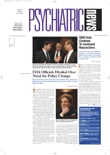Parents generally comprehend the research aims and procedures expressed in consent forms for participation in research studies, but a substantial minority are not clear about how treatment for each child is determined, according to a research study reported in the February Journal of the American Academy of Child and Adolescent Psychiatry.
“It is remarkable that the only area where a substantial proportion of parents apparently showed a misunderstanding was that about treatment assignment being randomly determined,” wrote Benedetto Vitiello, M.D., Michael Aman, Ph.D., Lawrence Scahill, Ph.D., and colleagues.
The researchers questioned 95 parents of autistic children who took part in an eight-week, randomized, double-blind, placebo-controlled, multisite, clinical trial of risperidone. The children displayed autism-associated behavioral problems such as aggression, severe tantrums, or self-injury. The trial results showed that risperidone produced better outcomes than placebo.
As the trial concluded, the parent who gave written consent (72 percent were the mothers of the subjects) answered a questionnaire. More than 9 out of 10 parents understood most of the terms of the clinical trial as it applied to their children. Between 91 percent and 98 percent could identify the study drug and knew of the double-blind nature of the trial, the probability of receiving a placebo, the medication's possible side effects, their right to withdraw their children from the trial, and risks and benefits to participation.
Ninety-nine percent said they had been adequately informed about the trial, had given written permission for their child's inclusion, were aware that their child might receive a placebo, and understood that testing medication efficacy was the goal of the trial.
Such understanding of research aims may be attributable to parents' high levels of postsecondary education (63 percent) and knowledge of autism and its treatments, a thorough consent process, and simple trial design.
However, many parents did not fully understand the idea of randomization, they reported. About 27 percent responded that the treatment choice for their child was based not on chance but on the individual needs of that child to ensure that he or she received the best possible treatment.
“In spite of the overall excellent level of understanding, it is remarkable that the only area where a substantial proportion of parents apparently showed a misunderstanding was that about treatment assignment being randomly determined,” said the researchers. The parents' educational level may have had some influence on their responses, they said. Of the parents with a college degree, 83 percent knew that treatment was randomly assigned, compared with 60 percent of those without a college degree (p=0.01).
“Failure to appreciate the experimental nature of therapeutic clinical trials may well be the most difficult aspect of clinical research for research participants to grasp,” said the researchers.
This misunderstanding among some parents may be due to the“ therapeutic misconception,” the belief that trial participants are getting good individualized care rather than taking part in a program to determine the best care for a similar class of patients. Vitiello and colleagues speculated that their questionnaire may have inadvertently misled some respondents by using the word “received” rather than“ assigned” in referring to study treatment. Better definition of terms and careful attention to creating more precisely worded questions might help future researchers and parents.
“The process of informing parents about research can be further improved by clarifying the meaning of randomization and of the distinction between research activities and personalized care,” said the authors.
An abstract of “Research Knowledge Among Parents of Children Participating in a Randomized Clinical Trial” is posted online at<www.jaacap.com/pt/re/jaacap/abstract.00004583-200502000-00006.htm>. A recent review of issues in pediatric clinical trials is posted at<www.thelancet.com/journal/vol364/iss9436/full/llan.364.9436.review—and—opinion.30592.1>.▪
